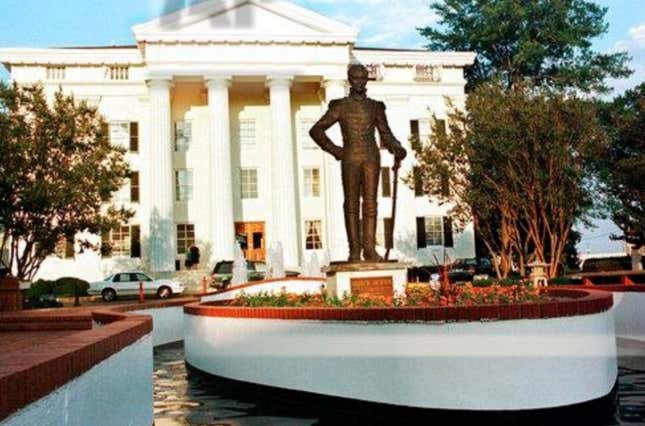
The movement to remove all monuments celebrating slavers, colonizers and oppressors continues in Jackson, Ms.—only, not quite. The city of Jackson isn’t doing away with its statue of 7th U.S. President Andrew Jackson (who the city is named for) altogether, it’s just moving the monument to racism from its prominent downtown area to somewhere where the racism will be less visible (and if that ain’t a metaphor for how America deals with racism in general, I don’t know what is). Jackson’s City Council voted in favor of the statue’s relocation on Tuesday.
According to ABC News, no plans for when and where the statue will be moved have been announced, but City Councilwoman Virgi Lindsay said it may end up going to a museum.
The proposal to remove the statue from in front of City Hall—where it has stood since 1972—was made by Councilman Kenneth Stokes. The vote was 5 to 1 in favor of its relocation with the council’s only Republican, Ashby Foote, casting the one dissenting vote.
Jackson—who served two terms as president from 1829 to 1837—wasn’t just a slave owner, but a man who was particularly passionate about preserving the institution of slavery.
From History.com:
During his lifetime (1767-1845), Jackson went from poverty to wealth because he personally embraced the institution of slavery. Enslaved workers grew his cotton, built and tended his house and helped him gain a social foothold in Southern society. Jackson owned as many as 161 enslaved people, buying and selling them, using their labor to build his fortune and even bringing them to the White House to work for him.
Records show he beat his enslaved workers, including doling out a brutal public whipping to a woman he felt had been “putting on airs.” And when any of them ran away, he pursued them and put them in chains when they were recovered. In an 1804 newspaper advertisement for a 30-year-old runaway named Tom, he offered an extra $10 for every 100 lashes doled out to the escapee.
As the United States expanded, the seventh president also opposed policies that would have outlawed slavery in western territories. And when abolitionists attempted to send anti-slavery tracts to the South during Jackson’s presidency, he helped ban their delivery and called the anti-slavery advocates monsters who should “atone for this wicked attempt with their lives.”
Seeing as Jackson’s population is about 82 percent Black, according to ABC, moving the statue away from the downtown area is likely a welcome gesture. Not as welcome as getting rid of it altogether and changing the name of the city while they’re at it, but still welcome.



